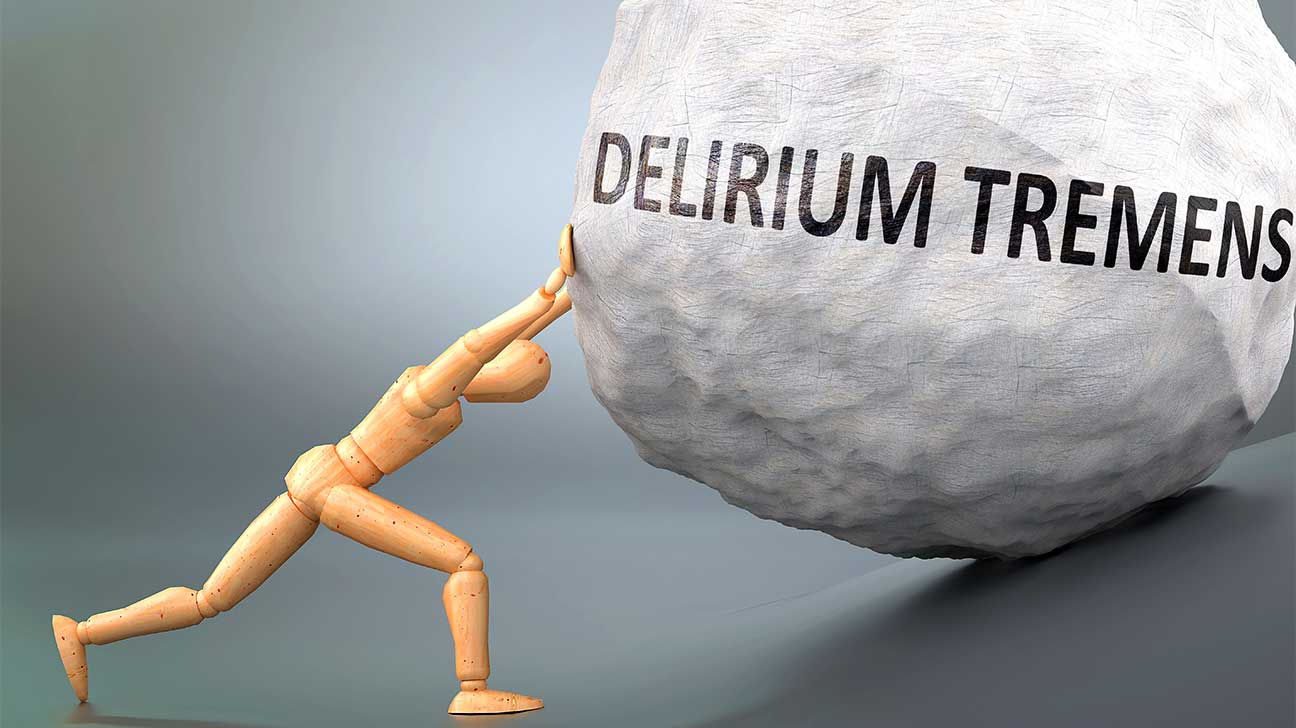
Delirium tremens (DTs), also known as alcohol withdrawal delirium (AWD), is the most severe form of alcohol withdrawal. If left untreated, DTs can be fatal.
DTs may occur when a person whose body is physically dependent on alcohol decides to suddenly stop drinking. Symptoms typically manifest between one and five days.
A person will typically experience seizures before showing signs of DTs. Withdrawal seizures can also occur without symptoms of DTs present.
Keep reading to learn more about DTs, including its causes, symptoms, and treatments.
1. What Is Delirium Tremens?
When a person with alcohol use disorder (AUD) develops alcohol dependence, their body may exhibit signs of physical withdrawal when the substance leaves their system.
DTs is the worst type of alcohol withdrawal symptoms and is both rare and life-threatening. DTs signifies that the body is in stage three of alcohol withdrawal syndrome (AWS).
DTs is characterized by sudden, intense changes to the mental and/or central nervous system. It involves a range of symptoms, of which confusion (delirium) is at the forefront.
DTs mostly affects people who have been drinking alcohol in large quantities, every day, for several months. People who have been drinking heavily for 10 or more years may also be affected.
Most people with alcohol use disorder will not experience DTs.
2. What Causes DTs?
Chronic, heavy alcohol consumption changes how the mind and body operate over time. The body becomes accustomed to the presence of alcohol and adapts to the substance in order to function.
When the body has adapted to the chronic, heavy use of alcohol for a month or more, suddenly cutting off alcohol intake can severely compromise regulation.
For a person who drinks heavily every day, or has been a heavy drinker for several years, the brain can become intensely overstimulated and experience confusion as it struggles to maintain normal function.
Ultimately, DTs represents a cascade of malfunction as the body struggles to re-regulate. Symptoms, such as high blood pressure and fast heart rate, can lead to other issues, such as stroke or heart attack, and become deadly.
3. What Are The Symptoms Of Delirium Tremens?
There are a range of symptoms that a person may experience as a result of DTs. Confusion, one of the characteristic symptoms, is recognized as a type of delirium specific to alcohol withdrawal.
Symptoms of DTs include:
- shakes or tremors
- disorientation
- headaches
- anxiety, agitation, or aggression
- nausea or vomiting
- heavy sweating
- dehydration
- fever
- fast heart rate (tachycardia)
- high blood pressure
- chest pain
- passing out
- sleeping for one day or more
- nightmares
- sensitivity to light, touch, and sound
- seizures
- psychosis symptoms, e.g., hallucinations or paranoia
4. Is Delirium Tremens Common?
DTs is not common. Only about 3% to 5% of people with alcohol use disorder will experience DTs.
5. Am I At Risk For DTs?
Anyone who heavily drinks alcohol, typically on a daily basis, is at risk of experiencing DTs. You don’t necessarily need to be a long-term heavy drinker to experience DTs.
“Heavy drinking” is considered 15 or more alcoholic beverages a week for men and eight or more alcoholic beverages a week for women. However, DTs is typically associated with heavier use.
People who have experienced signs of alcohol withdrawal in the past are also more likely to suffer from DTs, as are people with a history of seizures or a seizure disorder.
Other risk factors for DTs include heavy drinking with little food intake. DTs can also be caused by a head injury, illness, or infection in those with a history of alcohol use disorder.
6. How Long Does Delirium Tremens Last?
There is a general timeline for DTs, though not everyone who experiences DTs will follow this timeline.
Most people begin to experience DTs within 48 hours to 96 hours of their last drink. However, signs of DTs can present themselves as long as seven to 10 days after the last drink.
DTs is preceded by mild withdrawal symptoms, which present between eight and 24 hours after the last drink, and moderate withdrawal symptoms, which present 12 to 24 hours after the last drink.
Symptoms of DTs can last up to five days. Serious complications include visual or auditory hallucinations, loss of consciousness, irregular heartbeat, trouble breathing, sepsis, violent muscle contractions, coma, and even death.
7. Is Delirium Tremens Reversible?
DTs is reversible, but the effects of DTs can sometimes lead to long-lasting complications.
Some of the long-term effects of DTs include:
- anxiety and depression
- circulatory complications
- heart problems
- nutritional deficiencies, particularly Wernicke-Korsakoff syndrome, an alcohol-related B1 deficiency
- rhabdomyolysis, a condition that occurs when proteins and electrolytes from damaged muscle tissue are released in the blood
- seizures
- trouble sleeping
8. Is Delirium Tremens A Medical Emergency?
DTs is considered a medical emergency. Without medical intervention, there is a 15% mortality rate for people who experience DTs.
If you or a loved one are experiencing DTs, seek medical attention immediately to prevent a serious and irreversible outcome from occurring.
9. Can DTs Be Treated?
Healthcare providers may use benzodiazepines—such as lorazepam (Ativan), diazepam (Valium), or chlordiazepoxide (Librium)—to treat the symptoms of DTs while under care at a medical facility, and to reduce the risk of seizures.
Because DTs is a real and true possibility for heavy, long-term drinkers, people with alcohol use disorder are recommended to undergo detoxification in a hospital or treatment facility.
Alcohol detox under the care of medical professionals isn’t the only important step to consider in regard to DTs, however. Sobriety is the most effective means of preventing the occurrence of DTs ever again.
Entering into an inpatient or outpatient addiction treatment program after detox is completed can help a person develop the tools needed to address symptoms of alcohol use disorder.
Talk therapy with a licensed professional and peer-led support groups, like Alcoholics Anonymous, are other ways to support mental health and manage sobriety in the long term.
Get Help For Alcohol Addiction Today
Dealing with an alcohol addiction can feel exhausting, but there is hope for recovery. If you or a loved one has a substance abuse issue, contact DetoxRehabs.net and get connected with a treatment center today.
Article Sources- MedlinePlus – Delirium Tremens
https://medlineplus.gov/ency/article/000766.htm - ScienceDirect – Delirium Tremens
https://www.sciencedirect.com/topics/medicine-and-dentistry/delirium-tremens - StatPearls – Delirium Tremens
https://www.ncbi.nlm.nih.gov/books/NBK482134/ - The New England Journal Of Medicine – Recognition And Management of Withdrawal Delirium (Delirium Tremens)
https://www.nejm.org/doi/full/10.1056/nejmra1407298


